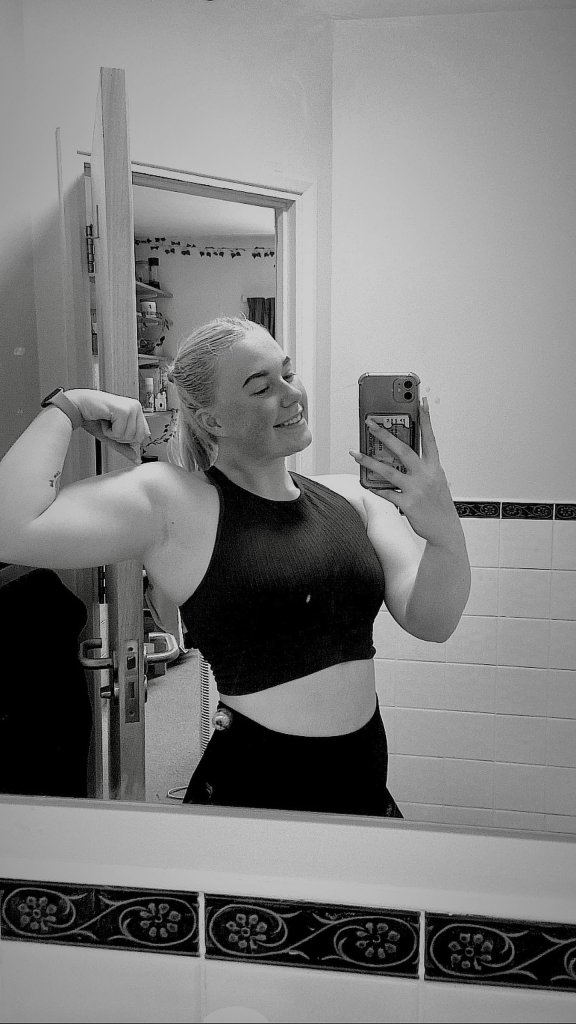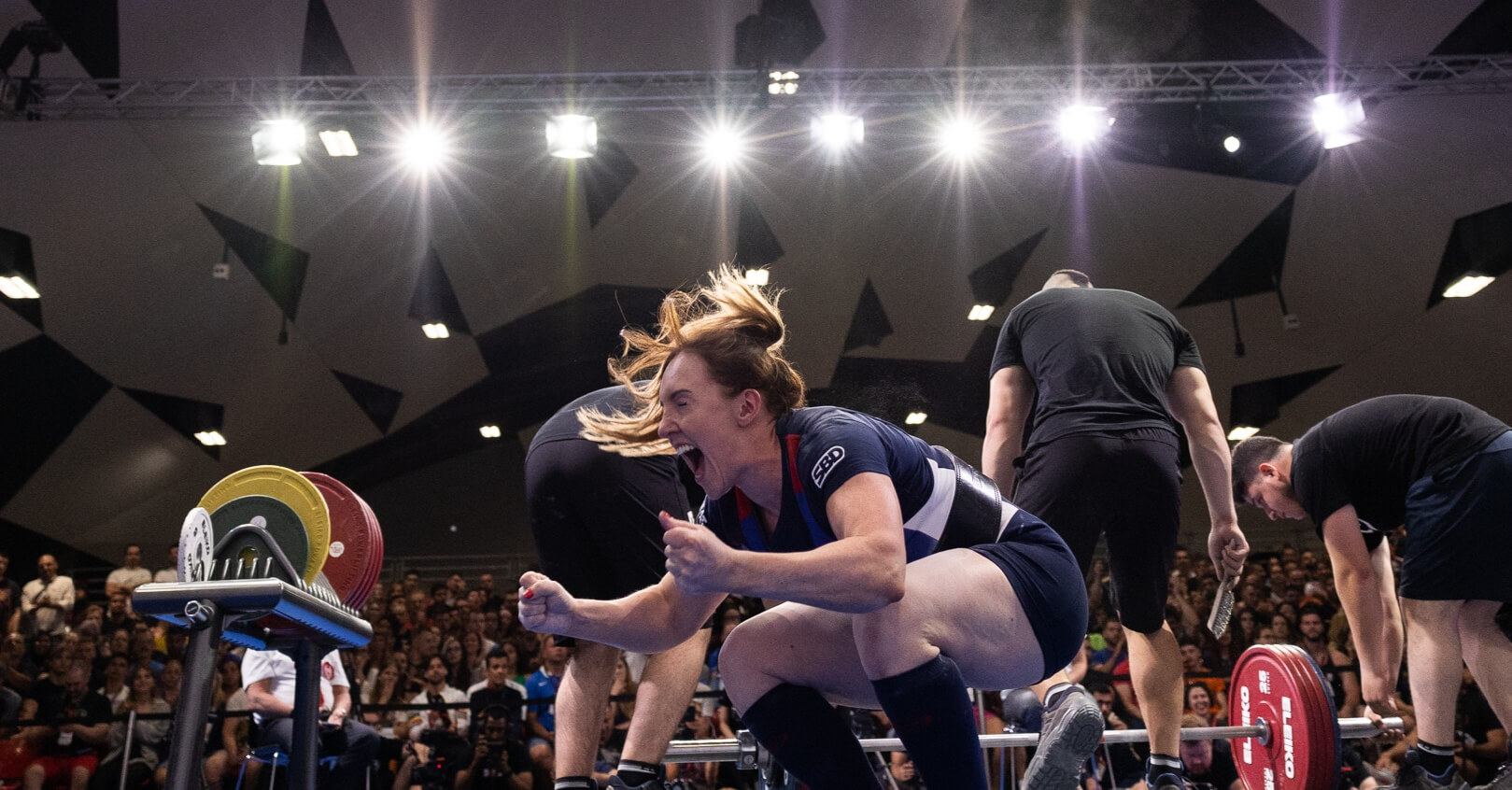In the realm of strength sports, where determination and grit converge to shatter barriers, a new force has been making waves across the scenic landscape of Scotland. A remarkable transformation is underway in the echoing halls of gyms and training centres, as a surge of powerfully determined women emerge to challenge conventions and redefine the essence of strength and athleticism.
As the world witnesses a resurgent interest in women’s sports, Scotland has become a flourishing hub for female powerlifters defying stereotypes and rewriting the narrative. With each resounding lift, they inspire a generation, proving that strength knows no gender boundaries.
Tasmin Campbell and Annie Nelson are some of the biggest stars in the powerlifting world to come out of Scotland in recent years, Tasmin is ranked no.1 in Scotland across all weight categories and no.1 in her weight category for the whole of the UK. She has represented Britain at the UK, European and World Championships. Annie has just returned from her second International Powerlifting Federation (IPF) World Open Championship for Team GB. We spoke to them as well as Mark Fulton of Paisley Barbell Club about what Powerlifting is, the mental and physical health benefits and the fact that there are plenty of women not only taking part in the sport but excelling on the world stage.
We also spoke to Jenna Allen, 21. Having recently completed her RAF training, she picked up powerlifting when she was training for her physicals, and since then found a love for weight training that has evolved into her favourite hobby. We asked her, how as a young woman picking up weights changed her mindset about society’s expectations of a woman and how it’s helped turn around her mental health.


Step into the world of Scotland’s powerhouse women, where the iron meets the will, and the reverberations of their triumphs echo far beyond the competition platform, resonating with a resounding message of empowerment, perseverance, and unyielding female strength.
Back in 2016, Tasmin became instantly hooked on powerlifting. An accountant based in Edinburgh might not be your first image of Scotland’s no.1 competitor but powerlifting women walk amongst us everywhere: “I sort of fell into powerlifting after stopping CrossFit and finding myself at a loose end. I didn’t know anything about powerlifting but I loved lifting heavy things and I wanted a new goal, so I signed up for a local competition. I just did it for a one-off bit of fun but I ended up placing first and breaking a couple of Scottish records.”
Powerlifting still isn’t a sport at the Olympic Games and is only included in the Para-Commonwealth Games. There is, however, weightlifting at the Olympic games but there is a slight difference between the two: “Powerlifting focuses on attaining maximum strength when performing one-rep maxes on three core lifts: squats, bench press, and deadlifts. Weightlifting or Olympic Weightlifting, puts an emphasis on technique for two types of lifts: snatches and clean-and-jerk. Both of which require a greater range of motion through full limb extension (Inspire Us).”
Even so, often there is still a stigma in both sports around women competing in such ‘manly’ spaces.
Realistically though, this is rarely the case, Tasmin speaks candidly about the fact she has obviously run into a couple of men who doubt her: “I’ve definitely had one or two snide comments about ‘lassies in the weights room’ in the past (not from powerlifters, just random gym bros), they pipe down when they see the weight on the bar. Luckily that’s been very few and far between,
“But the growth of female powerlifting has shown that women can be just as competitive as men when it comes to strength sports. Some of the strongest people in the world, pound-for-pound, are women. I still find a lot of men are genuinely surprised when they find out that I can outlift them, but on the whole, the perception that women can’t be strong is dying a much-needed death.”
Like with any sport, competing or just as a hobby, the mental side of it is the hardest to overcome and is rarely discussed. Habit is the easiest thing to form in terms of training, once you get yourself into a training pattern, it just becomes part of your everyday life. For Tasmin though, it’s getting over the self-doubt and imposter syndrome that doesn’t come as naturally: “I’ve had to do lots of work on improving my mental game over the years. In terms of the actual lifting, one thing I’ve learned is that you have to back yourself, no one else can do it for you. There’s no room for doubt when it comes to a heavy lift, you have to really believe you can do it.”


Powerlifting spaces in the gym and at competitions have evolved with the female side having just as much room. Nobody is seen as a lesser competitor because of their size, capability and least of all, gender. Tasmin explains her experience in the evolution of the sport since she started competing: “There’s a huge amount of respect on both the male and female sides for the women who are pushing boundaries and showing what’s possible,
“I used to be quite intimated by the women who are stronger than me but now, having met many of them (and they’re lovely), they motivate and inspire me. It’s good to have people above you whose numbers you can chase. It gives me the drive to train harder.”



Annie Nelson has been an athlete all her life, having competed in the 200m and 400m athletic races until she was 21. Four years on and having struggled with depression, she is now a full-time powerlifting coach and competitor: “Training wasn’t even helping which was very unusual. I realised I had to change something. I noted that the occasional weights training session I’d do I really enjoyed so I decided I’d take a leap of faith and change sports,
“It is extremely empowering sharing the platform with the world’s best, and actually very surreal. It’s very hard to believe I’m one of them. These women are so inspiring, showing you what’s possible and where the bar is set. The pressure and stakes are very high but I think that’s what makes it so exciting.”
Powerlifting, although at first glance might seem a daunting space for women especially, mostly because the people in the space are very strong and could definitely beat you at an arm wrestling match. Despite this, I was struggling to find any sort of negativity in the space at all. Annie shares her experience: “For those who are in the powerlifting world, nobody has lower expectations of you just for being female. If anything, they push you to reach even higher than you have done before. I used to find it very satisfying to prove those who doubted me wrong, however, I now focus more on my own path and don’t take too much interest in what other people’s expectations are of me. My own and my coach are the only ones that truly matter now.”
In this wild world of lifting heavy things, there is literally no difference whether you are male or female: “It helps that our male teammates are extremely supportive of us and treat us with the exact same level of respect as they would their fellow male teammates. Just pure love and passion for the sport. It’s very hard to stop somebody who loves what they do.”



Mark Fulton, is the Sponsorship and Merchandise coordinator for Scottish Powerlifting as well as Chairperson of the Paisley Barbell Powerlifting Club. Not forgetting he’s also a secondary school Guidance Teacher. Mark started powerlifting when he was 35, ‘late to the game’ some might say (his words not mine). But has several titles to his name including WDFPF World Champion, 2018.
At the club, Mark and his team are dedicating a lot of time to engaging newcomers to the sport. And have been doing this by hosting competitions that are free to enter. Over the course of the last seven competitions, there have been over 200 people taking part, all of which, was their first competition.
In the time that Mark has been competing, the sport has become more accessible: “Anyone can do it, that’s the amazing thing about it, is that you can have a group of people, different ages, genders and skills and it’s completely irrelevant because everyone’s aim is to do their best and lift the heaviest weight, you might not have had that when I first started but it’s completely changed now.”
A lot of women will start off going to the gym to lose weight, but these unrealistic goals in society are harming women, when the research shows that sports like powerlifting are way more beneficial in the long run for helping with strong bone density, your overall health and burning more calories over a long period of time.
Mark explains the rewarding work they are doing at Paisley Barbell: “One of our members previously suffered from an eating disorder and when she took up powerlifting it built back her relationship with food and exercise because she began to understand that in order to compete and do her best, her body needed the sustenance for fuelling the exercise she was doing, its stories like that that really motivate you to keep doing what you’re doing and encourage more people into the sport.”
Mark’s club were also the winner of the 2019 SW/S Community Club Award. Since winning the award, they have seen an increase in participation, sponsorship and women having the confidence to come along whether it’s just for fun or to compete: “There are no barriers in the sport, and the work being done by organisations in Scotland cannot go without praise, the fact that organisations still have to do this, shows there’s still a long way to go but we have to celebrate that we’ve changed the nature of the sport.”
Jenna Allen began powerlifting two years ago. She originally went to a personal trainer to focus on her cardio, for a fitness test she needed to get into the RAF: “Throughout the sessions, we began lifting weights to help improve movement and strength in my muscles to help decrease running times. I quickly realised I didn’t want to lift light weights and run, I wanted to be really strong. It gave me more of a buzz and a determination than cardio ever did.”
Jenna’s journey over the past couple of years is one of learning what her body is capable of and fighting societal stereotypes as well as her own expectations of what a woman’s body is ‘suppose to’ look like: “Before I started lifting I struggled a lot with how I looked and felt about my body. I never fit the ‘petite girl’ body type that I thought I wanted to be and had repeatedly seen on social media,
“As I started lifting weights I saw a lot of muscle growth in the beginning and I realised that the image I had in my head of what I should look like, had changed. I started working hard and taking care of my body, I stopped fighting all this negativity I had about myself which helped my mental health, so much so, I found myself with less anxiety, fears and overall, a more positive attitude.”



We see this constantly when reporting on any kind of sport, regardless of whether we’re talking to a world champion, or someone taking sports up as a hobby. The benefits of exercise, the impact on your mental well-being and the social impact that it can often have are repeated over and over. But the standout in Powerlifting is taking this bias that women for all of history have had pushed on them – that they cannot be stronger than a man, that they should be small and petite – is being completely thrown out the window by so many. In the gym, there are women lifting the same weights as men, in a lot of cases even heavier weights and not batting an eyelid at those who may have a problem with it.
It really is a sport for everyone.
Join us as we celebrate the relentless spirit of these extraordinary people, exploring the challenges they have overcome, the barriers they continue to break, and the boundless potential they envision for the future of women’s strength sports in Scotland. Through their unwavering dedication and fervour, they stand as living embodiments of empowerment, instilling courage and inspiring countless others to embrace their strength unapologetically.
If you’ve felt truly empowered by what you’ve read you might be looking for some advice on how best to get involved yourself, I frankly wouldn’t be qualified to give you any, so I shall leave you with what the professionals had to say.
Tasmin suggests: “I would say to absolutely try it! It’s great fun, really empowering and you can start at any age or level of fitness. It really is a sport for everyone. I would probably advise either joining a club or trying a session or two with a coach at first to learn the basics. You won’t be the only beginner there, and everyone starts from the beginning so don’t be intimidated,
“You can get more information about powerlifting, how competitions work and upcoming comps here. There’s also a Facebook group for members. It’s a really friendly community.”
Annie says: “I’d tell them to stop thinking about it and just do it – it’s probably going to be one of the best decisions you’ll ever make. Find a reliable coach who has lots of experience in it themselves, find a good gym with some nice people in it (as you’ll be spending a lot of time there) and don’t put any expectations on yourself. We all start somewhere and it’s important you’re even starting – it’s a marathon, not a sprint.”
Finally, Jenna shares her thoughts: “Do it! Even if it’s light, you don’t need to power lift extreme weight or compete. Working your muscles and building that strength is not only good for health but mental health as well. Don’t be worried about messing up form or thinking people are going to judge you. If you are not sure, just give it a go, you might be surprised.”




Thank you for providing such an informative and well-written blog post. The information you presented was supported by research and data, and I appreciated the practical applications and actionable steps you outlined. To explore more, click here.